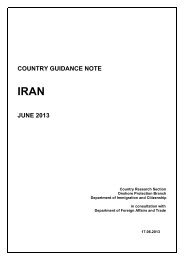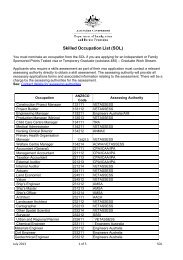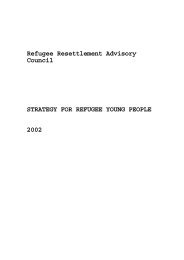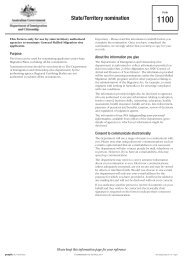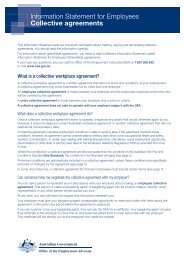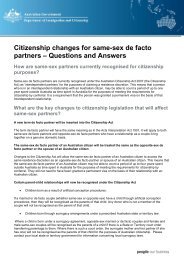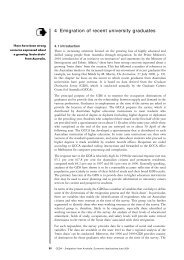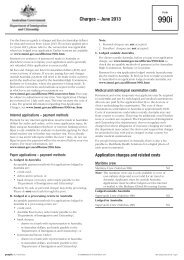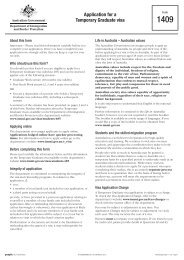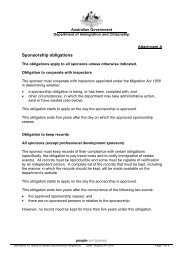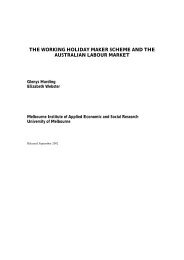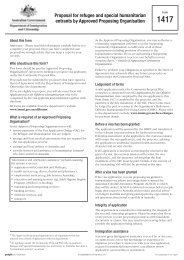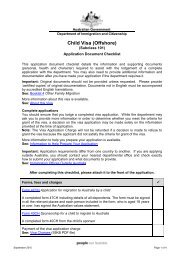Evaluation of the Integrated Humanitarian Settlement Strategy (IHSS)
Evaluation of the Integrated Humanitarian Settlement Strategy (IHSS)
Evaluation of the Integrated Humanitarian Settlement Strategy (IHSS)
Create successful ePaper yourself
Turn your PDF publications into a flip-book with our unique Google optimized e-Paper software.
The question arises, <strong>the</strong>n, as to what is a reasonable level <strong>of</strong> need at which to set a benchmark?<br />
How, in practice, can services be rationed in <strong>the</strong> face <strong>of</strong> entrants’ calls for support? It is clear that<br />
many service providers do not know how to or do not find it easy to decide where <strong>the</strong>ir role in<br />
providing initial settlement services reasonably ends. Fur<strong>the</strong>r, <strong>the</strong>y sometimes find it very difficult to<br />
draw <strong>the</strong> line with very needy clients and in fairness, sometimes this is not possible because <strong>of</strong> <strong>the</strong><br />
very real level <strong>of</strong> need. Additionally, <strong>the</strong> whole issue <strong>of</strong> initial settlement needs is clouded by some<br />
real gaps in <strong>the</strong> <strong>IHSS</strong> model.<br />
Gaps<br />
Several gaps were identified by <strong>the</strong> evaluation, where significant client needs were not addressed by<br />
<strong>IHSS</strong> contracts, although <strong>the</strong>re may be some debate about how many <strong>of</strong> <strong>the</strong>se are initial settlement<br />
needs and fall under <strong>the</strong> auspices <strong>of</strong> <strong>the</strong> <strong>IHSS</strong> service providers. Where <strong>the</strong> gap relates to a specific<br />
service type, <strong>the</strong> issue is explored in more depth in section 5 <strong>of</strong> this report. The gaps identified were<br />
as follows:<br />
IIOA providers are responsible for identifying and addressing client health issues in <strong>the</strong> first 24<br />
hours after arrival. In accordance with <strong>the</strong>ir contract requirements, EHAI service providers have<br />
up to two weeks to contact entrants to explain health services available to <strong>the</strong>m, including a<br />
physical health assessment. No one is clearly responsible for ensuring clients receive ongoing<br />
attention to health needs during <strong>the</strong> intervening period – a significant gap as many arrivals have<br />
health problems some <strong>of</strong> which may have public health implications. Service providers and<br />
stakeholders generally agreed that where appropriate, <strong>the</strong> physical health needs <strong>of</strong> entrants<br />
should be addressed on arrival by referral to a health provider. This would be consistent with<br />
<strong>IHSS</strong> principle (e): ‘<strong>the</strong> health and well-being <strong>of</strong> <strong>Humanitarian</strong> Program entrants are protected’.<br />
<br />
<br />
<br />
<br />
Goods supplied under HFS in some instances fell short <strong>of</strong> what clients are said to need. In <strong>the</strong><br />
evaluation, some clients reported problems in regard to <strong>the</strong> household goods provided to <strong>the</strong>m,<br />
but it was largely <strong>the</strong> service providers who were making <strong>the</strong> case that more or better quality<br />
goods were needed. It was felt that <strong>the</strong> basic HFS ‘kit’ needed to be enhanced and include<br />
additional items such as a heater in cold areas, a large refrigerator for large families, bed bases, a<br />
washing machine (particularly for large families) and where <strong>the</strong>re are small children, a cot and<br />
stroller. Whe<strong>the</strong>r identified by clients or service providers, it is felt that limits in <strong>the</strong> kind and/or<br />
quality <strong>of</strong> household goods provided can result in problems for many entrants.<br />
Clients have reported experiencing difficulties in obtaining assistance to install household goods<br />
(eg washing machines, refrigerators). Some DIMIA State <strong>of</strong>fice staff reported that <strong>the</strong>re had been<br />
significant problems caused by a lack <strong>of</strong> clarity within contracts regarding who is responsible for<br />
installing and assisting clients to operate appliances, and that <strong>the</strong>re had been a number <strong>of</strong><br />
instances where goods have been delivered on a family’s doorstep without fur<strong>the</strong>r assistance<br />
being provided.<br />
An increasing number <strong>of</strong> <strong>IHSS</strong> clients are from developing countries where <strong>the</strong>re has been no<br />
opportunity to develop skills for living in an urban society. There is currently a gap in <strong>the</strong> model in<br />
terms <strong>of</strong> providing <strong>the</strong> ‘life skills’ information and education opportunities that such clients need to<br />
manage <strong>the</strong>ir lives in Australia. For example, some refugees have never experienced <strong>the</strong> sort <strong>of</strong><br />
equipment available in Australian homes such as heating and kitchen appliances. In addition to<br />
<strong>the</strong> explanation on arrival that entrants are given, <strong>the</strong>re is a need for ongoing support to help<br />
some entrants adjust to life in Australia.<br />
The absence <strong>of</strong> provision <strong>of</strong> a telephone, particularly in short-term accommodation, results in<br />
situations where communication is made difficult for both entrants and service providers. In some<br />
20<br />
<strong>Evaluation</strong> <strong>of</strong> <strong>the</strong> <strong>Integrated</strong> <strong>Humanitarian</strong> <strong>Settlement</strong> <strong>Strategy</strong> 27 May 2003



